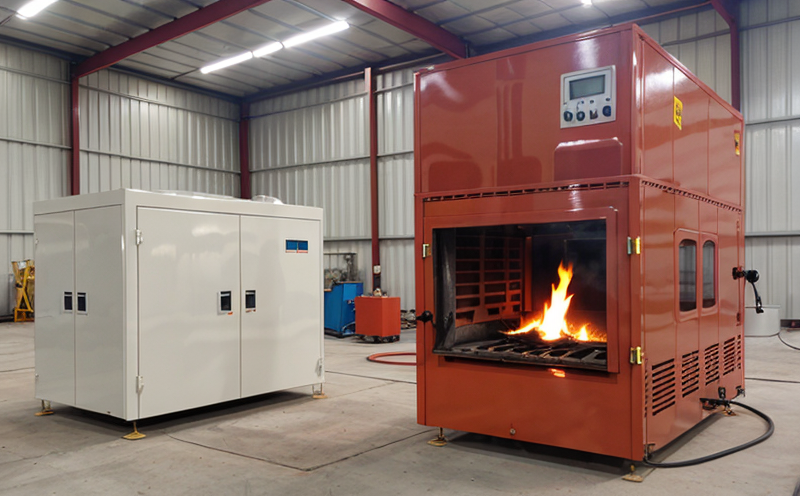ASTM E1952 Thermal Conductivity of Thin Films
The ASTM E1952 standard method is a critical tool in determining the thermal conductivity of thin films, which are widely used across various sectors including electronics, aerospace, automotive, and energy. This test helps ensure that materials perform optimally under extreme conditions by assessing their ability to conduct heat effectively.
Thin films play a crucial role in many advanced technologies due to their unique physical properties. These include high thermal conductivity, which is essential for managing heat generation within small electronic devices or large industrial equipment. The ASTM E1952 method measures the thermal conductivity of these thin films with precision and accuracy, providing data that can be used to optimize design, enhance performance, and improve product reliability.
The test procedure involves measuring the temperature gradient across a thin film sample while applying a constant heat flux. By doing so, it calculates the thermal resistance, which is inversely proportional to the thermal conductivity of the material. This method is particularly useful for materials with low thicknesses where other testing methods may not be suitable.
The precision and accuracy of ASTM E1952 are paramount in industries reliant on thin films. For instance, in aerospace applications, the ability to dissipate heat efficiently can prevent overheating and potential failures. In electronics, it ensures that components do not exceed their thermal limits, leading to longer operational lifespans.
The ASTM E1952 standard is widely recognized for its reliability and repeatability. It provides a standardized approach that allows laboratories across the globe to achieve consistent results. This uniformity in testing methods is crucial for industries where compliance with international standards is mandatory, ensuring interoperability of products within global markets.
The test setup typically includes a thin film sample mounted between two parallel plates with controlled heat flux and temperature gradient. The system measures the temperature difference across the sample to calculate thermal resistance. This method ensures that all variables are accounted for, providing accurate results even in complex scenarios involving multiple layers or composite materials.
Proper specimen preparation is key to obtaining reliable test results. Samples must be cut from larger pieces of material using precise methods to ensure uniformity and thickness within specified tolerances. The surface finish should also meet specific requirements to minimize any thermal resistance due to imperfections or roughness.
Instrumentation plays a critical role in ASTM E1952 testing, with specialized equipment designed to measure temperature gradients accurately. These instruments include calorimeters that can precisely control and monitor temperatures across the sample. Additionally, data acquisition systems collect and analyze this information, ensuring accurate reporting of results.
The application of ASTM E1952 extends beyond just determining thermal conductivity; it also contributes significantly to understanding how thin films behave under various conditions. This knowledge is invaluable for research and development teams working on new materials or improving existing ones. By identifying areas where improvements are needed, they can focus their efforts more effectively.
In conclusion, ASTM E1952 thermal conductivity testing of thin films is an indispensable part of ensuring high-quality performance across numerous industries. Its ability to provide precise measurements makes it essential for maintaining standards and meeting regulatory requirements worldwide.
Eurolab Advantages
At Eurolab, we pride ourselves on delivering exceptional quality and reliability in all our services. Our expertise in ASTM E1952 thermal conductivity testing of thin films ensures that you receive accurate and consistent results every time.
We employ state-of-the-art equipment and highly skilled technicians who adhere strictly to the latest standards and guidelines. This commitment guarantees that your samples are tested under controlled conditions, minimizing variability in outcomes.
- Our laboratory maintains accreditation from leading bodies such as ISO/IEC 17025, ensuring compliance with international quality management systems.
- We offer quick turnaround times without compromising on accuracy, allowing you to receive results promptly when needed most.
- A team of experienced engineers provides expert advice and guidance throughout the testing process, helping you make informed decisions based on our findings.
Quality and Reliability Assurance
At Eurolab, we understand the importance of quality and reliability in every aspect of our work. Our robust quality management system ensures that each ASTM E1952 thermal conductivity test adheres strictly to international standards like ISO/IEC 17025.
We maintain a cleanroom environment where tests are conducted, minimizing external factors that could affect the results. Additionally, our technicians undergo continuous training to stay updated on the latest techniques and methodologies in material testing.
Our calibration services guarantee that all instruments used during these tests are accurate and consistent over time. Regular audits by independent third parties further reinforce our commitment to excellence.
Environmental and Sustainability Contributions
Evaluating the thermal properties of thin films helps in designing more efficient systems, which can lead to significant reductions in energy consumption. By optimizing heat transfer processes through improved materials, we contribute positively towards reducing carbon footprints associated with manufacturing and operation.
Moreover, understanding how different coatings behave under varying temperatures allows for better resource utilization practices. For example, selecting thinner films where possible reduces material waste while maintaining necessary functionalities.





